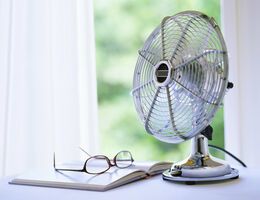Unexpected ways to beat the heat

June 20, 2024—Are heat and humidity giving you a meltdown? Extreme heat isn't just uncomfortable. It can be deadly—especially if you don't have air conditioning at home. Luckily, a few simple strategies can help you ride out the next heat wave in comfort.
Keep it breezy
When humidity is high, turn AC fans to low. A room air conditioner is a great option if you don't have central air. In most cases, you'll want to set the fan speed on high to maximize efficiency, says the U.S. Department of Energy. But when humidity is high, slower air movement helps remove moisture from the air, making your window unit more effective.
Cultivate a cross breeze. No AC? Position fans at different windows, with one bringing air in from the outside and the other blowing air out to boost cross-ventilation. If you have a ceiling fan, make sure it's set to turn counterclockwise.
An important caveat: Fans might make you feel more comfortable, but they won't prevent heat illness when temperatures are above 95 degrees, says the American Red Cross. And if it's hotter than 90 degrees, make sure fans aren't aimed at you directly. According to the National Weather Service, when temperatures are above 90 degrees, the blowing air can increase dehydration—making heat illness more likely.
Let in the night air. Open your windows when it's cooler (at night and in the morning) to let in the air and shut them during the afternoon to keep the hottest air out. Close curtains or shutters during the day to limit the amount of hot sunlight streaming through windows.
Cool your body
Apply some ice. Put cold packs or wraps on your head, neck or wrists. And don't underestimate the value of a cold shower. When you're done, run the exhaust fan in your bathroom to lower the humidity.
Avoid ice-cold drinks. In hot weather, you need more fluids than usual even if you are less active. Water is best, but make sure it's not ice-cold. Very cold drinks can give you stomach cramps. Working up a sweat? A sports drink or snack can help your body replace salt and other minerals.
Though frosty coffee drinks and frozen cocktails are tempting this time of year, steer clear of sugary, caffeinated and alcoholic beverages. They can prompt your body to lose more fluid.
Eat light. Stick to small meals. Choose cooling foods like fruit or salads. Avoid foods that are high in protein. Avoid using your oven or other large appliances.
Choose natural fibers for clothes and sheets. Opt for pieces with a loose fit to maximize airflow and stay cool. Sheets made from breathable cotton and bamboo can also help you sleep more comfortably.
More ways to get relief
Consider a swamp cooler. Also known as evaporating coolers, swamp coolers pass outdoor air over water-soaked pads, cooling the air. You can get some of the same effect by hanging wet towels in your room or placing a tray of ice behind a table fan. The main drawback? This alternative cooling system increases indoor humidity. Avoid it in humid areas.
Try a dehumidifier. If you do live in a humid climate, a dehumidifier might be your best friend. Humidity makes it very tough to sleep. These machines pull moisture out of the air, making it feel cooler and more comfortable so you can get some relief.
Go somewhere else. If it's hot at home, escape to some air conditioning during midday. Even a couple of hours can help your body stay cooler when you go back into the heat. Seek out air-conditioned public buildings like a local library or shopping mall.
Sources
- American Red Cross. “Extreme Heat Preparedness Checklist.” https://www.redcross.org/content/dam/redcross/get-help/pdfs/heat/EN_Extreme-Heat-Safety-Checklist.pdf.
- Centers for Disease Control and Prevention. “Preventing Heat-Related Illness.” https://www.cdc.gov/extreme-heat/prevention/index.html.
- Department of Energy. “Evaporative Coolers.” https://www.energy.gov/energysaver/evaporative-coolers.
- Department of Energy. "Fans for Cooling." https://www.energy.gov/energysaver/fans-cooling.
- Department of Energy. "Room Air Conditioners." https://www.energy.gov/energysaver/room-air-conditioners.
- FEMA. “Protect Yourself from Extreme Heat.” https://www.fema.gov/blog/9-ways-stay-cool-extreme-heat.
- National Weather Service. "During a Heat Wave." https://www.weather.gov/safety/heat-during.
- Sleep Foundation. "How To Cool a Room When It’s Too Hot to Sleep." https://www.sleepfoundation.org/bedroom-environment/how-to-cool-a-room-during-summer. World Health Organization. “Heatwaves: How to Stay Cool.” https://www.who.int/news-room/questions-and-answers/item/heatwaves-how-to-stay-cool.
